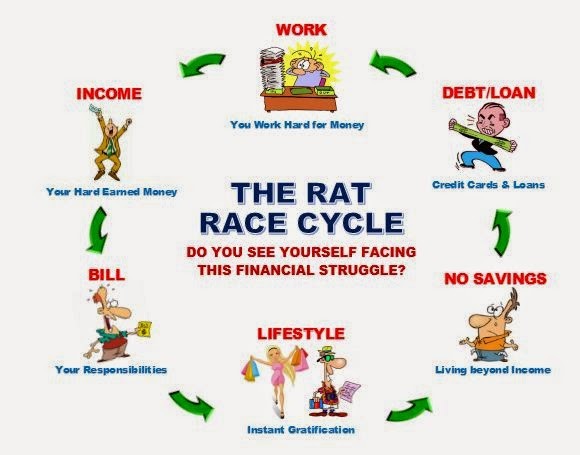A lot of people work hard.
There are possibly millions of recycling collectors in developing countries who get paid for finding bottles and other products that can be sold for a fraction of a cent for recycling.

If you were a recycling guy in a developing country, what’s your path to achieving success?
In China and many developing countries there are security guards. Their job is to stand by entrance of buildings and help with any issues. The salary might be around 300-600 USD per month with shared housing under the building. Most of the time there isn’t much to do.

If you were a security guard, what’s your path to success and owning your own property and having your own family and educating them?
For many people, like those two above, and in fact, all of us, to some level, the solution is not just to work harder, but in choosing how to direct your work. It is essential know what to work on. To look at your work from a higher, birds eye, perspective.
For the first one above, the recycling collector, it’s going to be very hard to become wealthy in this job. Working harder isn’t going to work because the model is just not efficient. The best way to a better life, is to change environment to change jobs. But how can you change jobs? when you probably don’t have skills for a better job. The answer is to find some way to learn the skills to get a better job. Getting some better clothes, so that they are presentable. finding a way to learn in all their free time, speaking to people. Moving to a better area, approaching people asking for jobs, and working a job that has a higher income, and spending all their free time trying to learn new skills. After learning new skills then they can get a better job, and keep rising up etc.,
For the security guard, it might be a bit easier. They could have opportunities in their current company to rise up. They could start by making sure they do all their work perfectly, and trying to be the best security guard possible. They can dress smart, and help train other guards in their team, and then ask management if there are any other open positions. If nothing comes of it, at the same time they can try to find new opportunities. Their work is quite secure, with fixed payments, they’re often working in a good environment. They can also spend their time learning new skills, especially if they have access to a phone, it might be easier. Because they are often working in nice areas with wealthier people, they can observe or get to know some of the people around them to learn what they do and get ideas. They can learn about different jobs, and learn the skills if needed and start applying for better jobs.
It seems easy for us to look at these two jobs, and say how they can grow, but often when someone is in that position, it’s hard to know these things. The same is true for all of us, we need to know how to direct our work properly and think about WHAT to work on. This is an extremely important skill for all of us.
Now we’ve looked at two examples, I want to explore a few other examples and try to work out what are the underlying principles on how to know what to work on.
Super market worker – similar to the security guard above. Do the best job, ask for opportunities to rise up, train on the side and explore other positions.
Lawyer – high income potential, can work on constantly improving themselves and their skills, getting better clients improving their appearance, energy. Building a strong supportive team so they can achieve more. Investing their income, in property, possibly in a side business. Opportunities to digitise the legal industry. Ability to build network effects.

How about for a business person? For a business person. They need to have some way of recognising limits in their current business. Valuing their time is extremely important.
What stops people from growth?
– Comfort – change might be risky or seem uncomfortable
– Not knowing or not thinking about it
– Getting distracted
The overall principles for growing are:
– It’s really important to think not just about working harder but what to work on
– It’s important to have a burning desire or ambition to do better – thinking bigger than your environment is not always easy, especially when everyone you know is thinking in a smaller way and you might have.
– Setting goals is essential and having a plan for growth
– Being self aware – recognising the limits of the current role, is it getting better or not?
– Don’t be afraid of risk or being uncomfortable of change. It’s necessary to change to upgrade.
– You are going to fail, you need to accept that. You’re going in a new direction, you don’t know the path, when you look for a new job you’re going to get rejected. This is the path. The important thing is to go on that path.
– Continually learning new skills
– Avoid distractions
How do you recognise the limits of a current role:
– Is it growing or not?
– What are the things to do to get to the next level of income?
Realise that most people are stuck to some level, as if in a rat race, putting in effort but not really advancing.

If you want to go somewhere you’ve never been, and you’re not on target to go there now, you’ve got to do things you’ve never done.
Recognise the opportunities and some ways to grow, such as:
– Finance – investing it smart, using investment
– Hiring a team, delegation
– Prioritising your time into the highest leverage activities
– Creating content
– Sharpening your skills – hard and soft skills
– Tracking your position
– Health and energy
– Working well with people
– Dressing well
– Seeking feedback and ways to improve
– Setting goals
Examples of SMART Goals:
- Personal Finance: Save $10,000 in 12 months by cutting down on unnecessary expenses and depositing $835 each month into a high-yield savings account.
- Health and Fitness: Lose 20 pounds in 4 months by following a balanced diet, exercising for 30 minutes at least five times per week, and tracking daily caloric intake.
- Career Development: Obtain a professional certification in your field within the next 6 months by enrolling in an online course, studying for 1 hour each day, and scheduling the certification exam.
- Personal Growth: Improve public speaking skills within 3 months by joining a local Toastmasters club, attending weekly meetings, and delivering at least one speech per month.
- Relationships: Strengthen your bond with a friend or family member by scheduling a weekly call or meeting to catch up and share experiences.
Becoming Self-Aware of Strengths, Weaknesses, Values, and Passions:
- Reflect on past experiences: Analyze situations in which you’ve excelled or struggled. Identify the strengths and weaknesses that contributed to those outcomes.
- Seek feedback: Ask for honest feedback from friends, family, colleagues, or mentors. They may provide insights into your strengths and weaknesses that you may not have recognized.
- Take personality tests or assessments: Tools like the Myers-Briggs Type Indicator (MBTI), StrengthsFinder, or the Enneagram can help you gain insights into your personality traits, strengths, and weaknesses.
- Identify your core values: Reflect on what truly matters to you in life, such as honesty, loyalty, creativity, or family. These values can guide your decision-making and help you understand what drives your actions.
- Explore your passions: Think about activities or topics that genuinely excite and interest you. Consider how you can incorporate these passions into your personal and professional life.
- Journaling: Regularly write down your thoughts, feelings, and experiences. This practice can help you gain a deeper understanding of yourself and identify patterns in your behavior and emotions.
- Set aside time for self-reflection: Dedicate regular time for introspection and self-evaluation. Reflect on your progress, setbacks, and areas where you’d like to improve.
By following these steps and being open to self-discovery, you can become more self-aware of your strengths, weaknesses, values, and passions. This understanding will help you set SMART goals aligned with your true desires and capabilities, ultimately leading to greater personal and professional growth.